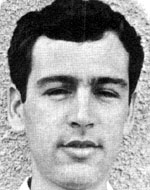Livnat (Weiss), Yehoshua (Shuki)
Son of Moshe and Hedva. He was born on November 6, 1946 in Santa Maria Delauca, Italy. He immigrated to Israel with his family on an arduous journey on the illegal immigrant ship Tirat Zvi on the eve of the establishment of the State of Israel in 1948. Shuki studied at the Merkaz elementary school and the HN elementary school. Bialik graduated from the Samet School in Haifa and grew up in the Hebrew language, and forced his parents to adapt to the language by speaking only Hebrew with him, and he was very successful in his high school and was awarded a special prize for his academic achievements. He was a talented painter in his childhood, and his paintings adorned the walls of the school, where he loved to play sports and excelled in the basketball game, and as a child he was a player in the basketball team of the Maccabi youth movement Who later joined the Hanoar Haoved Vehalomed movement, was active in the council and also worked as a counselor He was also a member of the students’ committee, was involved in the decoration of the school and contributed his talents to the best of his ability.As soon as his studies ended, In July 1964. His course during the course was both enjoyable and difficult. It was unusual for him to be chosen to represent the IAF as a flight attendant in a delegation of Gadanim who went abroad – and then changed his family name from Weiss to Livnat. At the end of the course, in July 1966, he took part in a parachute training course and was sent to an IAF squadron. After a while he passed an officers’ course and advanced quickly as a pilot. During the Six-Day War, Shuki fought in Sinai and the Golan Heights and was commended by his commanders. After the war he moved to light helicopter pilots, established as a lesson from the war, and was among its founders. Two years later, Shuki moved to a helicopter squadron, where he spent most of his career in the Israel Air Force and progressed to the position of deputy squadron commander. Because of his great success in his position and his desire to contribute to the IDF and the State his talents, Shuki decided to continue serving in the IDF as part of the permanent army. Later he married Snunit, and in 1971 his first son, Gadi, was born. Over the years the family grew, and a second son – Yoav, and a daughter – Nurit was born. Shuki went on a mission to the United States, and during the Yom Kippur War, Shuki passed through the squadron, among the top leaders and educating a young generation of pilots while fighting difficult battles. – Helicopters. With the establishment of the unit, he became its commander and was highly respected in the way he fulfilled his duties. After completing this position he was elected to the position of commander of the operational squadron, first rank in the corps. A short time before this position was accepted, Shuki was killed while carrying out his duties. On May 10, 1977, Shuki was killed while carrying out a helicopter crash in the Jordan Valley. He was laid to rest in the military cemetery in Haifa. He left behind a wife, two sons, a daughter of parents and a brother. After his fall, he was promoted to lieutenant colonel. In his letter of condolence to the bereaved family, his friend, the commander of the squadron, wrote: “In Shuki’s behavior and in his system of considerations, the desire to carry out things thoroughly and with integrity, justice and high morals always stood in my way. He died in his attempt to learn his role in his own way, out of a desire to get to know the subjects and people he had to work with directly: Shuki’s death is a great loss not only for his family but for all his friends, the Air Force and the State of Israel. ” His family commemorated him in a memorial plaque at the Gibor Israel Synagogue in Kiryat Eliezer in Haifa. His name was also immortalized in the Samet School in Haifa,Where he studied – in the award of a scholarship every year to an outstanding student in the electronics engineering program.
